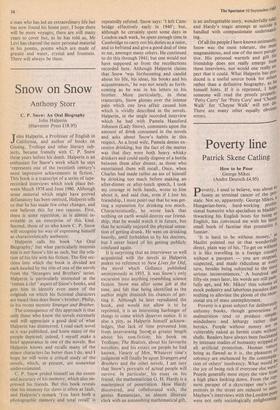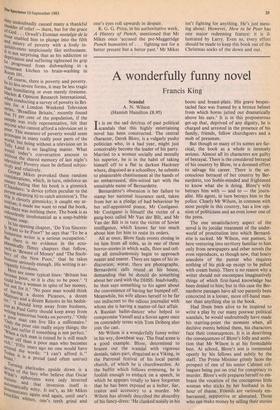Poverty line
Patrick Skene Catling How to be Poor
George Mikes (Andre Deutsch 1.4.95)
PI used to believe, was about as 1 funny as terminal cancer of the Pro- state. Not so, apparently. George Mikes, a Hungarian-born, hard-working prof es. sional humorist who specialises in bladder- thwacking his English hosts for being English, has convinced me with his lates,' small book of facetiae that prostatitis funnier. 'It is hard to be without money,' 85 Hazlitt pointed out in that wonderfullY direct, plain way of his. `To get on without it is like travelling in a foreign countri without a passport — you are stoPPen suspected, and made ridiculous at eve" turn, besides being subjected to the ta05c1 serious inconveniences.' A hundred all fifty-six years later, his words are still pain; fully apt, and Mr. Mikes' thin volume °I mock pedantry and laborious paradox does nothing to alleviate the gloom of the reces- sional era of mass unemployment. Poverty is a great subject for deliberate lYi unfunny books, though generations 0 malnutrition tend to produce simple mindedness and lethargy rather than heroics. People without money are as vulnerably naked as hermit crabs without shells. Readers have always been fascinateaf by intimate studies of humanity stripPecl°, all artificial protection. Human natur'; being as flawed as it is, the pleasures °' solvency are enchanced by the conten1131°' tion of others' insolvency. What would hoe the joy of being rich if everyone else were; People generally most enjoy the view fr°1/1 a high place looking down. From the tor most parapet of a skyscraper one's coal- petitors in the street are reduced to an Mayhew's interviews with the- London P0°F: were not only sociologically enlightening, they undoubtedly caused many a thankful Shudder of relief — there, but for the grace of God. . . Orwell's Etonian nostalgie de la boue enabled him to plunge into the filth and misery of poverty with a lively in- quisitiveness suspiciously like enthusiasm. It is not surprising that as his addiction to uePrivation and suffering tightened its grip he progressed from dishwashing in a restaurant kitchen to brain-washing in Room 101. , Of course, there is poverty and poverty. in its less severe forms, it may be less tragic than' humiliating or even merely tiresome. Market & Opinion Research International, when conducting a survey of poverty in Bri- ,ta.itl, for a London Weekend Television flr'es, 'Breadline Britain,' recently found "tat 51 per cent of the population, if the samPle was truly representative, felt that anYone who cannot afford a television set is P°or. This measure of poverty would seem grotesque in many really poor parts of the World; but being without a television set in Telly Land is no laughing matter. What Would today's conversation amount to Without the shared memory of last night's ,te. levision? Poverty must be defined subjec- `ivelY and relatively.
George Mikes provoked these random considerations, which, in turn, reinforce an Uneasy feeling that his book is a gimmick Chambers. 'a device (often peculiar to the
P..erson adopting it) to catch attention'). The ttitle is cleverly gimmicky; it caught my at-
and ther ention; it made me want to read the book,
ce was nothing there. The book is as olourlessly insubstantial as a soap-bubble Without soap. , in his opening chapter, 'Do You Sincere- 1111 Want to be Poor?' he says that 'To be a orous writer is a serious occupation.' there is no evidence in the ecto- Plasib•cad —IY flimsy chapters that follow, i3ttch as 'Beware of Money' and 'The Snob- henry of the New Poor,' that he takes ro Mour seriously enough. His writing is ar- gantlY frivolous. bellere are some typical lines: 'Britain has Poor, so it is chic to be poor.' I hutod love a woman in spite of her money, cu 3r not for it,' No poor man would think lyb „having a dozen Picassos, a dozen ter"lisses and a dozen Renoirs in his bedsit- Jur `1 should keep away from business, wr.t.as Paul Getty should keep away from a DIM% humorous books on poverty.' Only °(:". man can live like a millionaire.' trehlit): the Poor can really enjoy things; the Just suffer if something is not perfect., Ce'rtnen a rich man is ruined he is still much riehe,r °ff than a poor man who becomes uite 4FiftY years ago no one would have Todred the words: "I can't afford it." beasaty, it is a Proud (and often untrue)
Turnin wdeiviidce ofgthPe lazy whoupside down is a
who believe that Oscar truism: aphorisms were only inverted
ant and that inversion itself is
deinc"aticallY witty. It isn't, as Mr Mikes , nu onstrates again and again, until one's
ckles whiten, one's teeth grind and one's eyes roll upwards in despair.
R. G. G. Price, in his authoritative work, A History of Punch, mentioned that Mr Mikes once 'accused the pre-Muggeridge Punch humorists of . . . fighting not for a better present but a better past.' Mr Mikes isn't fighting for anything. He's just mess- ing about. However, How to be Poor has one major redeeming feature: it is il- lustrated by Larry. Even so, every effort should be made to keep this book out of the Christmas socks of the down and out.







































 Previous page
Previous page